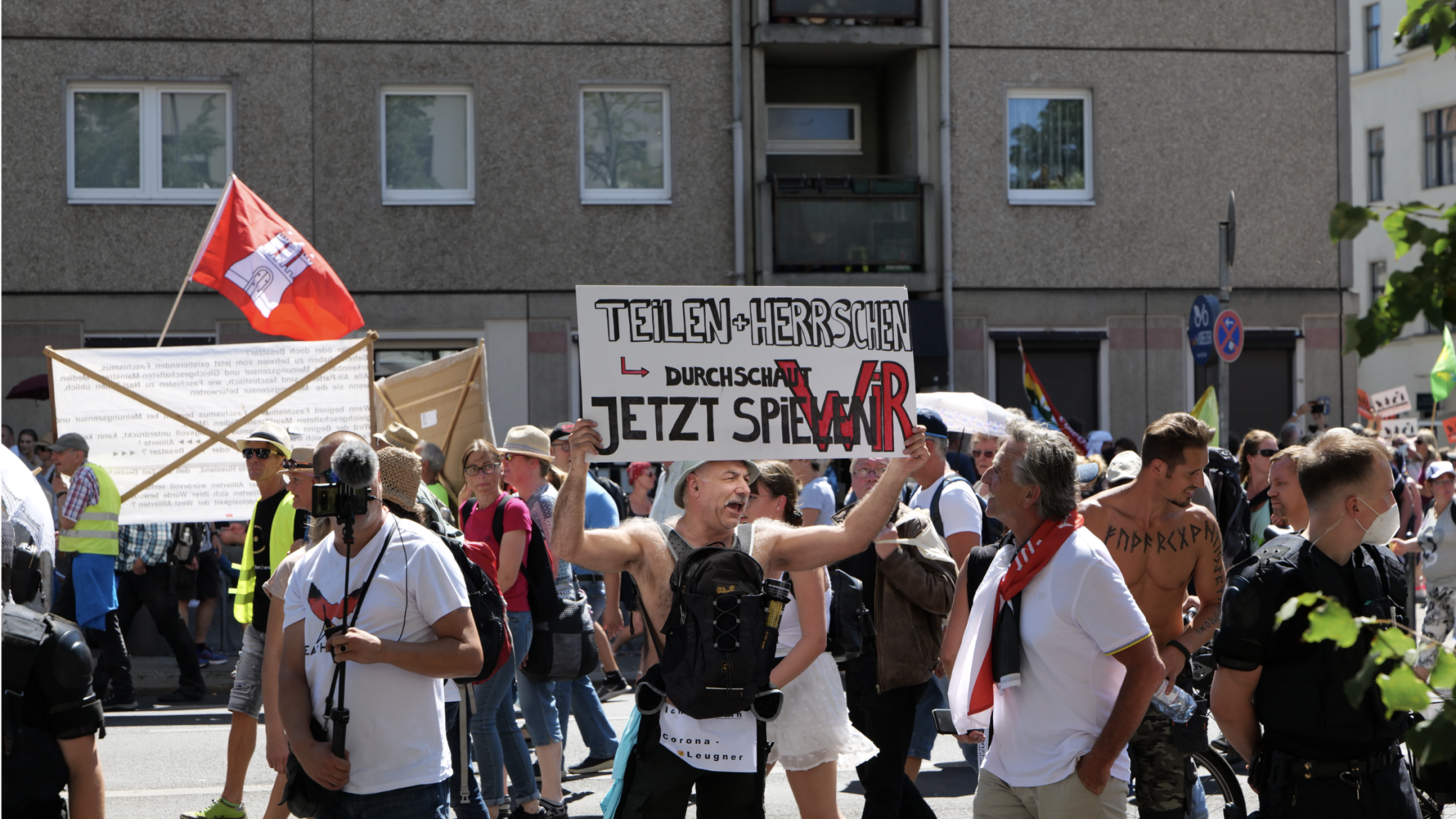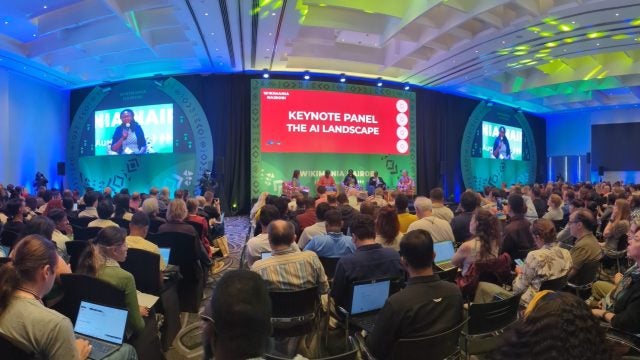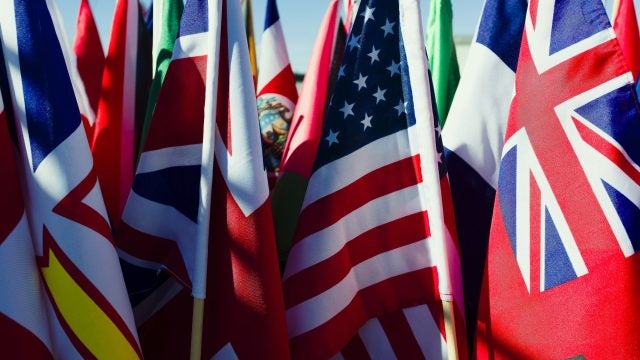
Title: Elusive Truths: Why Good Policies Alone Won’t Save Democracy
Disinformation is pulling at the seams of our already frayed societies. Democracies face an epistemic crisis of daunting proportions coupled with the erosion of trust in institutions and public authorities. Policy solutions alone won’t be enough to repair the social fabric. Democracies must restore the conditions for citizens to embrace a common reality where public truths are worth preserving.
The battle over vaccine mandates in Chicago and the catastrophic flooding in Germany earlier this year appear to be worlds apart. But their parallel trajectories underscore a dangerous trend: the rise of disinformation and the threat it poses to democratic politics in the United States and Europe.
On October 15, 2021, an estimated 4,500 police officers in Chicago, a third of the city’s total police force, refused to report their vaccine status to the city. These police officers acted in defiance of city rules and risked no-pay status at a time when Chicago was experiencing a surge in violent crime. The police union’s president, John Catanzara, called on the officers not to comply with the city’s registration guidelines. Catanzara had publicly opposed a vaccine mandate for the police, which he compared to Nazi Germany, and which the mayor consequently dropped. The city government elected to sue Catanzara for misleading police officers and lying about the proposed policies.
Across the Atlantic, another showdown took place in Ahrweiler, Germany, when one of the worst floods in centuries hit the region and killed almost 200 people. Supporters of the anti-lockdown Querdenker movement showed up to the disaster scenes. They livestreamed from the flooded streets, drove around in vehicles that resembled police cars, and disseminated misinformation through megaphones. Among their many false claims, the anti-lockdown protesters warned that the disaster relief provided by the authorities would soon end and residents would be left alone.
Policy alone can’t repair social fabric
Both Chicago and Ahrweiler highlight a danger and a dilemma. The danger is that disinformation poses a threat not only to the health of digital ecosystems, but also to the physical health and safety of citizens. The dilemma cuts to the heart of Western democracies. Lies, disinformation, and outright falsehoods are not just spreading faster than the truth; they are challenging the very premise of democratic societies: that free and equal citizens can reason together and arrive at workable solutions that benefit the common good. Truth-subverters are taking aim at democratic institutions by undermining citizens’ trust in public authority. Basic norms and principles related to openness, honesty and truth-telling are under attack. In this environment, policy solutions are not enough to generate the consensus needed to repair the social fabric. We have lost the ability to come to an agreement on what is true and false. Democracies face an epistemic crisis, and the only way out is to restore the conditions for citizens to inhabit a common reality. Doing so will require democratic leaders and citizens to reinvigorate civil discourse offline, foster resilient institutions at the local level, and burst the filter bubbles we have built around us. This task will not be easy, but it is necessary to save democracy.
The common hope and understanding of centrist political leaders today—including many in the United States and Europe—is that tribal battles can be defused and political divides can be healed with the right policies. For that to happen, so the thinking goes, democracies have to deliver policies that create jobs, increase economic and social well-being, reduce inequality, and expand choices for citizens.[1] The calculation is that material improvements in peoples’ lives will promote trust in institutions and faith in the government, thereby mending a fractured society. Good policies are good politics, these leaders argue, and they will encourage citizens to come back into the public sphere to negotiate political compromises or give their assent to compromises negotiated on their behalf.
While policies that seek to mend social fractures and economic inequalities are worth pursuing, many democratic leaders are failing to address the epistemic crisis that stalks Western democracies. Public deliberation across party lines has declined or ceased to function, even though the technical capabilities to exchange information and ideas have never been greater. Worse, political polarization is leading to disdain or outright hate of “the other side.” Democratic societies need to address the decay of public truths and the rampant mistrust in political institutions. Only by establishing a common basis for public deliberation will any well-intended policies have a lasting impact.
The extent to which disinformation remains on the fringes or goes mainstream in Western democracies depends on historical narratives, the strength and health of institutions and the public media, the openness of political systems, and discrepancies in educational curricula. One thing is certain: If truth-subverters find their way into government, they can use their public megaphones to wreak havoc on democracy. Consider the case of Robert Fico, former prime minister of Slovakia. Fico pushed anti-Semitic conspiracy theories and blamed the president of Slovakia for colluding with George Soros to oust him from office. In Central and Eastern Europe, Slovakia’s citizens are the most susceptible to conspiracy theories. Similarly, Prime Minister of Slovenia Janesz Jansa accused members of the European Parliament of being “Soros puppets” when they attempted to investigate the state of press freedom in his country.
Restoring trust through public reasoning
“Knowledge polarization,” as the philosopher Michael Lynch describes it, makes it more likely that some voters will dismiss any positive effects of government policies on their lives. Not only are societies disagreeing on values and facts; they disagree on how to determine the facts. To put it bluntly: a Republican voter who gets child tax benefits from a Democratic-led government will not change their perception of the 2020 election result or their belief in the “Big Lie” because they trust those within their own peer group with establishing the truth. Democratic and Republican voters increasingly live in separate media ecosystems, which drives and sustains their partisan disagreements: the Democratic voter will hail the child tax benefit; meanwhile, the Republican voter will remain convinced that the elections were rigged to the detriment of the Republican Party.
Material progress alone will not translate into durable trust in institutions if constituents do not share a common set of facts. Democracies rely on “serviceable truths” that combine the dictates of science with a deliberative process of public reasoning and justification that brings in diverse perspectives. The process of acquiring these truths is broken in many Western democracies.
The anti-lockdown protesters who attempted to hijack rescue operations during the floods in Ahrweiler, Germany, are a case in point. Government authorities were on the defensive and struggled to communicate effectively in this crisis. The Querdenker movement filled the void with disinformation and built a supply center at a school in Ahrweiler where the like-minded could congregate. Even if the truth-subverters claimed only a fleeting success, the barrage of falsehoods further eroded trust in the ability of the government to deliver services during a catastrophe.
Democracies must increase trust in institutions and restore the conditions for political truths. There is no one-size-fits-all approach, but the best way forward is to start small and on the local level. Civic leaders and everyday citizens have to increase the spaces where people from diverse backgrounds can find meaningful opportunities for conversation offline and develop the habits of self-government. For example, the nonprofit “Braver Angels” seeks to depolarize American society through face-to-face dialogues. Initiatives such as these give citizens the tools to listen and reflect on their own biases and predilections.
Another way to foster civil discourse and deliberation is to have representatives of the institutions that are under fire (media, justice, health) be more transparent and proactive in explaining the way they operate. This emphasis on process could take many forms. For example, journalists, judges, doctors, and scientists should participate more frequently in town halls, school board meetings, and other occasions where diverse groups come together. The point is not that everyone will agree, but rather that citizens who feel left out and unseen will begin to stake a claim in the institutions of a free society and no longer see them as the concern of a distant, undemocratic elite.
In the case of the vaccine mandate for police officers in Chicago, for example, the city government could have brought in epidemiologists for a dialogue with the police on why a vaccine mandate for professions who interact daily with vulnerable populations is the scientifically sound path forward. Again, consensus may prove elusive. But the in-person dialogue itself—and the potential buy-in this process could elicit—is what matters.
The Hard Work of Negotiating Truths
Lastly—and this is the most difficult part—democratic political systems must be strengthened and resilience must be built into institutions. Even the most enduring forms of consensus can unravel. Resilience should be the watchword. By enabling common political institutions to absorb sharp differences and fierce ideological battles, democratic leaders will make it harder for truth-subverters in power to further erode checks and balances. Mayors and other local leaders should create new civic fora and spaces that bring people together around common issues that impact the community. Common deliberation won’t end disinformation, but focusing on shared problems at the local level will constrict the space for ideological sparring and instill the habits of citizenship. Best practices on information consumption and critical analysis need to be incorporated into educational curricula. Schools are the first line of defense for democracy and students need to reacquire the skills to sort truth from falsehoods and form opinions based on facts.
Western democracies face an epistemic crisis, which means that knowledge alone will not save us. Good policy will not staunch the flow of bad information. Democracies will need to rediscover that while truths are fragile and consensus is often elusive, the strength of democracy is in the doing. Process is just as important as principle, and serviceable truths begin where dogmatism ends.
[1] In the announcement of the Summit for Democracy, the U.S. government framed the stakes as follows: “As President Biden has said, we have to prove democracy still works and can improve people’s lives in tangible ways.” https://www.state.gov/summit-for-democracy/.
…
Teresa Eder is a program associate for the Global Europe Program at the Wilson Center. Previously, she worked as a journalist and TV-news producer for German TV ARD and ZDF in Washington, D.C., and as Deputy Head of the Foreign Desk for the Austrian newspaper “Der Standard” in Vienna. Her producing, writing, and research focus on transatlantic relations, social and economic inequality on both sides of the Atlantic, and issues of extremism & disinformation. Teresa has also worked as a consultant at the IMF Communications Department and the World Bank (Social Protection & Labor). She holds a Master’s degree in International Relations from Georgetown University’s School of Foreign Service, a Master’s degree in Political Science from the University of Vienna, and a journalism degree from the University of Applied Sciences in Vienna.
Image Credit: Leonhard Lenz, CC0

This article compares U.S. and Chinese approaches to artificial intelligence (AI) exports in Africa and examines how these disparate approaches have produced both downstream benefits and challenges for the region.

On May 20, 2025, the World Health Assembly unanimously adopted the World Health Organization (WHO) Pandemic Agreement, an international treaty designed to strengthen pandemic prevention, preparedness, and…

As the Trump administration proposes a sweeping overhaul of the US foreign assistance architecture by dismantling USAID, the Millennium Challenge Corporation (MCC), and restructuring the State Department, there is an…